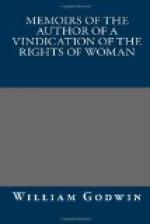Observe the consequence of this! While she was, and constantly professed to be, an unmarried mother; she was fit society for the squeamish and the formal. The moment she acknowledged herself a wife, and that by a marriage perhaps unexceptionable, the case was altered. Mary and myself, ignorant as we were of these elevated refinements, supposed that our marriage would place her upon a surer footing in the calendar of polished society, than ever. But it forced these people to see the truth, and to confess their belief of what they had carefully been told; and this they could not forgive. Be it remarked, that the date of our marriage had nothing to do with this, that question being never once mentioned during this period. Mary indeed had, till now, retained the name of Imlay which had first been assumed from necessity in France; but its being retained thus long, was purely from the aukwardness that attends the introduction of a change, and not from an apprehension of consequences of this sort. Her scrupulous explicitness as to the nature of her situation, surely sufficed to make the name she bore perfectly immaterial.
It is impossible to relate the particulars of such a story, but in the language of contempt and ridicule. A serious reflection however upon the whole, ought to awaken emotions of a different sort. Mary retained the most numerous portion of her acquaintance, and the majority of those whom she principally valued. It was only the supporters and the subjects of the unprincipled manners of a court, that she lost. This however is immaterial. The tendency of the proceeding, strictly considered, and uniformly acted upon, would have been to proscribe her from all valuable society. And who was the person proscribed? The firmest champion, and, as I strongly suspect, the greatest ornament her sex ever had to boast! A woman, with sentiments as pure, as refined, and as delicate, as ever inhabited a human heart! It is fit that such persons should stand by, that we may have room enough for the dull and insolent dictators, the gamblers and demireps of polished society!
Two of the persons, the loss of whose acquaintance Mary principally regretted upon this occasion, were Mrs. Inchbald and Mrs. Siddons. Their acquaintance, it is perhaps fair to observe, is to be ranked among her recent acquisitions. Mrs. Siddons, I am sure, regretted the necessity, which she conceived to be imposed on her by the peculiarity of her situation, to conform to the rules I have described. She is endowed with that rich and generous sensibility, which should best enable its possessor completely to feel the merits of her deceased friend. She very truly observes, in a letter now before me, that the Travels in Norway were read by no one, who was in possession of “more reciprocity of feeling, or more deeply impressed with admiration of the writer’s extraordinary powers.”




